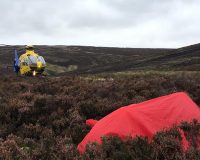This article is adapted from a piece that originally appeared on our Mountain Services website. However the advice and procedures detailed below are relevant for anyone who might interact with at risk individuals – we feel that most definitely includes Mental Health First Aiders!
We closed the last safeguarding article with these words: these are the four main characteristics of an adult who a child or vulnerable adult is likely to put their trust in:
- Being there; children, young people and the vulnerable want to have the general feeling that someone is there for them.
- Proving themselves; taking the time to listen, acting appropriately and keeping promises.
- Having the right attitude; not losing their temper or trying to take over.
- Knowing what they’re talking about; sharing relevant experience and helping them develop as people.

As these characteristics represent someone who’d make a great Outdoor Leader I think it’s reasonable to say that we potentially have a higher possibility of being someone to whom a child or vulnerable adult might make a disclosure to. If we factor in that we may well be placing that individual into an environment where they are in a heightened emotional state then I think it becomes beholden on us to know what do do if the situation occurs.
I’ll say at this point – it’s comparatively rare for a child to disclose abuse directly – often concerns are raised based on observation – however if it does happen then there are some simple Do’s & Don’ts that make a real difference.
Children & the vulnerable place a real importance on being believed – something many of us are lucky enough to simply take for granted. It must always be remembered that speaking out, telling someone, takes immense courage – if we handle it wrongly then it may never happen again.
Do…
- Respect them. This is one of the bravest things a person can do.
- React in a calm way. Look at them directly with open body language.
- Listen. Just listen.
- Remember that the safety and well being of the individual is paramount.
- Let them know that you are taking the matter seriously.
- Check that you have heard correctly, ask them gently to repeat any bits you are unsure of.
- Tell them what you are going to do next to help them and who you are going to tell.
- Make a record – just what was said, any physical observations and the date and time.
Don’t…
- Do not promise confidentiality. Let them know you will need to tell others who will also try to help them.
- Don’t look shocked or express an opinion based on your beliefs of knowledge.
- Don’t ask leading or probing questions. Do not fill in gaps, but maybe ask for more information in their own words.
- Don’t try to investigate the matter yourself or confront the perpetrator.
- Don’t delay reporting.
- Don’t share the information with anyone outside of the safeguarding process.
Non of that should be challenging – and in practice it feels right because it’s the right thing to do, but naturally it will be upsetting for the individual and you.

It really helps to pause and consider your replies – we’ve all felt vulnerable and taken words the wrong way – if this is the first time someone has been brave enough to raise the subject, or even worse they’ve not been listened to before then how we interact with them may well shape their immediate future, may well help them begin the process of trusting again.
Some simple phrases to consider in helping you deal with a disclosure that I’ve seen put to great effect are:
“You have done the right thing in telling me”
“I will only share what you’ve told me with people who are going to help you”
“You are not to blame, this is not your fault”

Obviously no-one would intentionally make such a distressing situation worse. A simple pause before we reply can often ensure our response is more considered – but it’s worth remembering that we will also probably be in a heightened emotional state. On our courses we role play some examples of phrases that I’m sure we can all imagine, or worse have heard: –
“Oh no I can’t believe it”
“But XXX is such a nice person”
“Is this really true?”
“Oh that explains a lot”
And as a simple catch all avoiding asking specific questions – the “who, where, when, why, what” questions is always a good way to make sure you record their words not your interpretation.
Afterwards…

Sit down, take some time for you. Process it, and if you’ve followed these suggestions, if you know you’ve done your best – that hopefully someone’s life will become a little better. I’ve been involved directly in this process three times now – and it’s emotionally draining – I didn’t sleep properly for days afterwards the first time, fortunately I got excellent support consequently from the team I’m involved with and that really helped, make sure you do too.
If you’ve found this post interesting please comment – details of our safeguarding courses can be found on the site.










